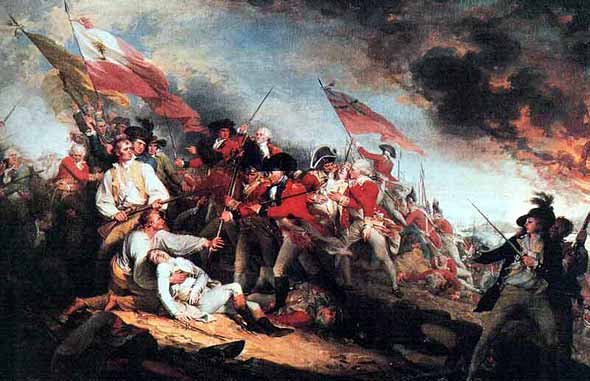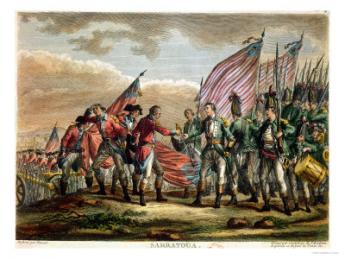Related Topics
The British Attack Philadelphia
Fighting in the Revolutionary War lasted eight years; for two years (June 1776 to June 1778) Philadelphia was the main military objective of the British.
Philadelphia Vaguely Hears About Bunker Hill
The thirteen English colonies were far apart in the Eighteenth century, communicated very little, regarded their religions as more or less hostile to each other. July 4, 1776, was indeed a major turning point, but Thomas Jefferson's role was mainly to write a defensive tract to convince the colonial population and the rest of the world that the colonies had little choice but to fight. It was mainly Benjamin Franklin who recognized they could not win without foreign support, and could not expect foreign (French) support if they appeared to be willing to rejoin the British Empire. In a single action, more or less on one day, the American Revolution was transformed from New England demanding a separate parliament within a Commonwealth, into thirteen colonies fighting for Independence from Great Britain. Such a war could not be won without Virginia, the largest and richest colony, or without Pennsylvania, physically uniting the other two power centers. Virginia had serious difficulties with the British concerning its tobacco trade and its local land ambitions. Essentially, the main holdout was Pennsylvania, whose main problem now was that it was a contented prosperous state, suddenly forced to make unwelcome choices. Without Franklin's presence, it is hard to guess how things would have turned out.

|
| Bunker Hill |
To this day, Pennsylvania has trouble appreciating that things in Boston had gone too far for New England to turn back. The quarrels about English rule had gone on for decades, and the actual warfare had escalated over three years since the Tea Party, leading to thousands of casualties. Too many people had friends and relatives killed to suppress the urge for vengeance. The British king was now revealed as deeply involved in British politics and was not at all the benign father figure he had been portrayed. The British Army thought of itself as the mightiest war machine in the world and was not going to tolerate or soon forget a bloody defeat at Bunker Hill. The Prohibition Acts had been passed, the fleet had been assembled, the honor was at stake. The Quakers of Pennsylvania may have thought they had a choice, but they had little choice.

|
| Battle of Saratoga |
As a matter of fact, the British had little choice left, once the battle of Saratoga was over. With France convinced to join us (mainly by Franklin), the hope of suppressing the revolt by lack of colonist gunpowder and money was lost, and British public opinion grew progressively more opposed to warring against fellow Englishmen. Lord North seems to have realized this when he sent the Earl of Northumberland to Philadelphia to explore reconciliation, but the momentum of war forced him out of office. And the bloody revolution continued for five more years before the defeat at Yorktown forced an end to it.
The Battle of Bunker Hill probably had more effect than the questionable victory it supplied. The Americans had dragged the cannon from Ticonderoga up the mountain and they were placed on Boston's Dorchester Heights. The British saw them and rushed to get their fleet out of Boston, away from those cannon. But the Americans had no gunpowder, and Washington must have noticed you could beat the British by keeping your own nerve, even if they outnumbered you. And it wasn't the first time he saw the Brits run, he saw the same thing when he was with General Braddock.
Originally published: Friday, May 24, 2013; most-recently modified: Tuesday, August 27, 2019